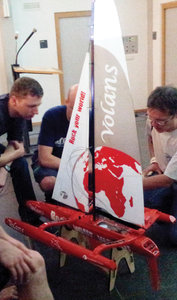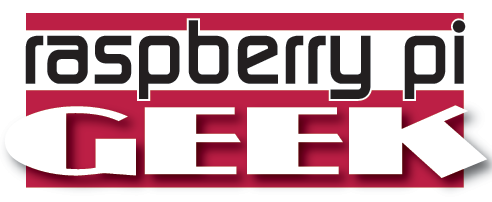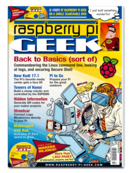Event Report: Pi and More 3
Pi Sail
The "Pi Sail" talk revealed details of a project sponsored by the Nikolaus Koch Foundation. In this project, students write programs for a Raspberry Pi, which takes over the helm of a small model of a sailboat (Figure 4). On board the boat, along with the Pi, are two servomotors that actuate the helm and the sails. Also in use are various sensors – such as ultrasound or infrared – whose values are evaluated by the program to steer the boat correspondingly.
 Figure 4: With a Raspberry Pi as an electronic skipper, sailboats like this are due to go racing in 2014.
Figure 4: With a Raspberry Pi as an electronic skipper, sailboats like this are due to go racing in 2014.
Pi Sail participants are first given a software tool that helps them evaluate their algorithms on a virtual sailboat, before they are expected to demonstrate their prowess with a real boat. Just like the various low-level specialties of the hardware controls, this simulator was implemented by computer science students so that the school students could concentrate fully on the steering logic of their programs.
A sailing regatta is planned for 2014, in which miniature boats from all participating student groups can compete against one another: The idea is to maneuver your own boat as close to the target as possible, without colliding with other objects or capsizing. The boats (costing some EUR 600 each) are sponsored by various companies who display their logos on the clearly visible sails.
This project aims to introduce young people to computer science in an enjoyable way. Because the students are not simply writing abstract programs that output data on screen but are creating code that interacts with the physical world, the initiators hope to generate interest among young people. Groups of school students can register online for the Pi Sail project [7]; however, the website was not ready when this issue went to press.
More Jams
In the evening, those attendees with a longer journey home headed for the parking lot, while others gathered for a barbecue. While enjoying the barbecue, the participants reviewed the day's events.
One inevitable question was: Why are there not more German-language Raspberry Pi jams? Certainly, more than the 100 participants in Trier would benefit from this kind of event. Another question was: What will young people who start coding and soldering at 10 to 12 years of age be capable of by the time they reach 25?
Basically, such events provide greater understanding of the potential that resides in the Raspberry Pi. Perhaps Germany can follow the Rasp Pi jam trend that is currently the rage in the UK: Raspberry Pis at every school and active user groups for enthusiasts of all ages.
Interview Pi and (much) More?
Representing the voluntary helpers on the organizational team, Daniel Fett and Christopher Perrin answered a few of our questions about Pi and More on the fringe of the event.
Q Pi and More is taking place for the third time. What originally gave you the idea of organizing a German-language Raspberry Pi jam?
A We had talked a lot about the Rasp Pi and its capabilities with friends. "Have you got one already, or are you still on the waiting list?" was one of the typical questions. In these talks, we decided that an event would be a good idea.
Q In Great Britain, Pi jams are already widespread. In Germany, your jam seems to be the only one happening.
A There is a Brit who organized Raspberry Pi jams at English schools in Germany. Apart from him, we probably really are the only ones.
Q Does Pi and More have a specific focus – for example, maker topics or the like?
A No, basically the choice of topics is balanced. The first two events were fairly technical. But by now we have organized offerings for people who want to attend a newcomers workshop or who are interested in using the Rasp Pi in education.
Q Do you follow any specific goals with the event?
A Everyone who helps will definitely have their own personal goals. Some of them learned much thanks to the C64 [Commodore 64] in their childhood and would like to see the Rasp Pi more heavily involved in computer science teaching: With a small device that has technical limits, it is easier to acquire a great deal of technical know-how in a relaxed way. Other people are looking for a meeting at which hackers can exchange details of their projects. Incidentally, the "… and More" in the event's name means that Arduino and the like are also welcome.
Q Entry is free and some of the speakers came from abroad. How do you finance that; do you rely on sponsorship?
A No, everything is voluntary. The speakers came without our being able to promise to refund their expenses.
Q What does the future hold? For example, the 100 seats at the event were fully booked this time. Do you intend to keep growing at future events?
A We only want to keep on growing if the quality does not suffer because of this. For example, the helpers had enough on their hands with lending hardware, selling food, wiring up the network, and so on. If we have more visitors, the question is where we can set up more tables for hackers at the venue. We could also envisage offering different tracks in the future so that visitors are spread a bit more, and more people can attend.
Infos
- Pi and More: http://www.piandmore.de(in German)
- Teaching materials for the Rasp Pi: http://www.medienistik.de/Themenheft_RaspberryPi.pdf (in German)
- Screenly: http://www.screenlyapp.com
- KiCad: http://www.kicad-pcb.org
- Ladder Game: https://projects.drogon.net/raspberry-pi/gpio-examples/ladder-game/
- Sunwell project: http://www.nico-maas.de/wordpress/
- Pi Sail: http://pitoern.uni-trier.de (in German)
« Previous 1 2 3 Next »
Buy this article as PDF
Pages: 4
(incl. VAT)







